5 Best Generators for Full-Time RV Living + Boondocking
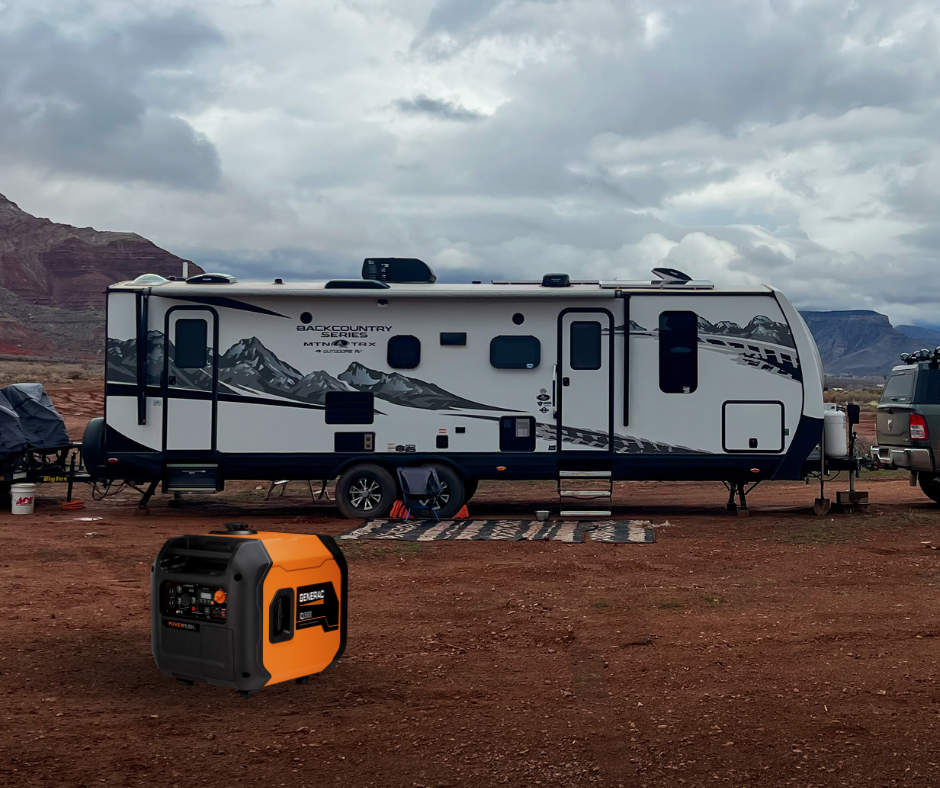
As full-time RVers since 2019, who almost exclusively boondock, having a generator is a necessary part of our lifestyle. No matter how much we plan ahead or how efficient our solar panels are, there are times when we simply need more power to keep our RV comfortable and functional.
Rainy days, for instance, can put a damper on our solar panel production, leaving us with depleted batteries. And let’s not forget about those sweltering summer afternoons when the A/C is a must-have. And during the winter months, when there’s less daylight, a generator provides the power we need to keep powering our laptops and our internet provider, Starlink.
After going through our fair share of generators and experiencing their strengths and limitations, we have meticulously narrowed down our top picks for the best generators specifically tailored for full-time RV living.
Table of Contents
ToggleHow do Generators Power an RV?
Generators work by burning gasoline in an internal combustion engine, which drives a rotor that generates electrical energy. The electrical energy is then transferred to outlets on the generator, where it can be used to power your RV.
Generators function similarly to RV shore power in that they connect to your AC system and supply AC power. The amount of power they offer is generally determined by the generator’s size and is usually less than what shore power can provide.
Why You Need a Generator for Full-Time RV Living
If you live full-time in your RV, you’re most likely a digital nomad, working remotely from the comfort of your home on wheels. But wait, you’re parked in the middle of nowhere with no access to reliable power. What do you do?
That’s where a generator comes in! With a generator, you can power your laptop, charge your phone, and even connect to Starlink to stay connected and productive while off the grid. Additionally, it allows you to have backup power during inclement weather, extended boondocking capabilities, or emergency preparedness.
Understanding Your RV's Power Needs
Before you can choose the right generator, it’s important to figure out how much power you need. This involves adding up the wattage of all the appliances you want to run simultaneously.
Let’s say you want to run your air conditioner (2000 watts), microwave (1000 watts), computers (150 watts), and Starlink satellite internet system (75 watts) all at once. This adds up to a total of 3225 watts. To account for other potential loads, you should add a 20% safety margin. That means you’ll need a generator with a minimum capacity of 3870 watts to power all these appliances at once.
However, you most likely won’t be running the air conditioner while running the microwave, so you may be able to get away with a smaller generator.
Choosing the Right Generator Size
Here’s the deal—different devices have different wattage needs. Some require a lot of power to get started, while others need less. And that’s where running wattage, starting wattage, and surge wattage come in.
Running wattage is what you need to keep your device running smoothly, while starting wattage is the extra push needed to get things started. And surge wattage gives you the maximum amount of juice your generator can deliver. For example, some appliances, like air conditioners, require a high startup surge wattage before settling into their running wattage.
Overloading a generator can cause damage to both the generator and your appliances, so choosing the right size is critical.
But here’s the kicker—you don’t want to max out your generator’s capacity. You want to keep it at 90 percent or lower. Why, you ask? Well, because generators that are constantly running at their maximum capacity are like marathon runners who never get to rest. Over time, this puts a tremendous amount of strain on the generator’s motor and other components, leading to premature failure.
Conventional vs. Inverter Generators
One important factor to consider when choosing a generator for your RV is the type of generator. There are several types of generators available, but the two most common types are conventional generators and inverter generators.
Conventional Generators
Conventional generators use an alternator to produce AC power. Conventional generators are typically best for situations where you need a lot of power output for a short period of time.
For example, if you need to power a large air conditioner or other high-demand appliance, a conventional generator with a high wattage output may be the best option.
However, conventional generators tend to be louder and less fuel-efficient than inverter generators, which can make them less ideal for full-time RV living.
inverter Generators
Inverter generators, on the other hand, use advanced technology to produce AC power.
They convert the AC power produced by the alternator into DC power and then back into clean, stable AC power with very low total harmonic distortion.
This means that they are better suited for situations where you need a lower level of power output over a longer period of time.
Additionally, they tend to be much quieter than conventional generators, which can be a major advantage if you’re using your RV in a campground or other quiet location.
Top 5 Portable Generators for Full-Time RV Living
Without further ado, here are our top picks for the best inverter generators for full-time RV living. We’ve taken into account factors such as noise level, fuel efficiency, and ease of use to help you find the perfect generator for your needs.
1. Generac GP3500iO
We currently own and highly recommend the Generac GP3500iO portable inverter generator for RVers. This generator is a bit on the pricy side, but it has a number of features that make it an ideal choice for full-time RV living.
Noise level: One of the best things about the Generac is how quiet it is. I mean, we’ve had some generators in the past that sounded like a chainsaw, but this one is whisperer quiet. At only 59 decibels, even our friends comment on how they didn’t hear us fire it up at midnight when we lost power (and I need my fan running to sleep!)
Wattage: With 3,500 running watts and 4,000 starting watts, this generator is a powerhouse that can handle most appliances and electronics in an RV. Additionally, the generator comes equipped with a digital smart LCD that displays the wattage meter, run time remaining, generator status, hour meter, and fuel level.
Portability: I won’t lie, the Generac is a big boy and is not easy to move around. But it does have a handle.
Special Features: What sets this generator apart from others on the market are the special features that make it a breeze to use. First off, the electric start is a game-changer. No more pulling cords or dealing with finicky engines. Secondly, the low oil shutdown is a lifesaver, helping to protect the engine and prevent any damage.
2. Yamaha EF2200iS
The Yamaha EF2200iS Inverter Generator is another great choice for full-time RV living as it offers a reliable and consistent power source. It has a 2200 wattage output and can run for up to 10 hours on a single tank of gas, making it ideal for those who are looking for a long-lasting generator.
Wattage: With its 2200 wattage output, the Yamaha EF2200iS Inverter Generator is capable of powering most of the appliances in an RV. It can easily run a refrigerator, TV, lights, and even a small air conditioning unit. It’s perfect for those who don’t require too much power but still want a reliable and efficient generator.
Noise Level: One of the best features of the Yamaha EF2200iS Inverter Generator is its quiet operation. It has a noise level of only 57 decibels, making it one of the quietest generators on the market. This makes it a great choice for those who are looking for a generator that won’t disturb their neighbors or other campers.
Portability: At 55.2 pounds, the Yamaha EF2200iS Inverter Generator is relatively lightweight and easy to move around. It also comes with a convenient handle, making it easy to carry from one location to another. However, it should be noted that it’s not as compact as some of the other models on the market, so it may not be the best choice for those who have limited storage space.
3. Honda EU2200i Inverter Generator
This Honda EU2200i generator is a popular model among full-time RVers, and for good reason. I know a few people who swear by this generator, and after checking it out myself, I can see why.
Wattage: At 2200 watts, the Honda EU2200i is no slouch when it comes to power output. It can handle most RV appliances and electronics with ease, so you don’t have to worry about not having enough juice for your adventures.
Noise Level: But what really sets this generator apart is how super quiet it is. I mean, this thing is like a ninja – you barely even know it’s running. At only 48 decibels, you can have a conversation right next to it without raising your voice. That’s perfect for those times when you want to enjoy the peace and quiet of nature without disturbing the wildlife or your fellow campers.
Portability: As a full-time RVer, I know how important portability is, and the Honda EU2200i delivers on that front. At only 46.5 pounds, it’s one of the lightest generators out there, so you can easily move it around. Plus, it comes with a recoil starter, which means you don’t have to worry about any complicated electronic start-up systems.
Special Features: But what really impressed me about the Honda EU2200i is the included Honda My Generator app, which offers remote generator operation and monitoring. How cool is that? You can turn the generator on and off from your smartphone, and even monitor things like fuel levels and run times. It’s like having a personal assistant for your generator, which is a huge plus for those of us who want to keep tabs on things while on the road.
4. Champion 200987 4500-Watt Inverter Generator
This Champion 200987 4500-watt generator is beast of a machine that makes a great choice for those who want a powerful and reliable generator for their full-time RV living adventures. After looking at the specs, its a top contender for those who have high power needs.
Wattage: At 4500 watts, this generator packs some serious power. You’ll be able to run multiple appliances and electronics at the same time without worrying about running out of juice. This is especially handy if you have a larger RV with more power-hungry appliances like air conditioners or microwaves.
Noise Level: The noise level of the Champion 4500-Watt is not as super quiet as the Honda EU2200i, but it’s still pretty quiet at 64 decibels. You can have a conversation near it without having to raise your voice too much.
Portability: At 97 pounds, the Champion 4500-Watt is not the lightest generator out there, but it’s still relatively easy to move around. Plus, it comes with a special feature that makes it super convenient for RV living: the wireless remote start. You can start and stop the generator from up to 80 feet away, which is perfect for those times when you’re inside your RV and don’t want to go outside to turn it on or off.
Special Features: Another cool feature of the Champion 4500-Watt is its parallel-ready capability. With the optional parallel kit (sold separately), you can connect this generator with another 2800-watt or higher Champion inverter to double your output power. This is perfect for those times when you need even more power, like when running multiple high-powered appliances at the same time.
5. WEN 56380i 3800-Watt Inverter Generator
Another powerful and reliable generator that can handle all your RV living needs is the WEN 3800-watt inverter generator. With some impressive specs, this generator is well-equipped to handle the demands of a mobile lifestyle.
Wattage: At 3800 surge watts and 3400 rated watts, this generator provides enough power to run your RV appliances and electronics with ease. Whether you’re looking to power your air conditioner, microwave, or TV, the WEN has got you covered.
Noise Level: One of the standout features of the WEN is its super quiet operation. At only 57 decibels, it’s one of the quietest generators on the market. This is perfect for RV living as you won’t have to worry about disturbing your neighbors or waking up your family with a loud generator.
Portability: At 99.2 pounds, the WEN is not the lightest generator out there, but it’s still portable enough for most RVers. Plus, it comes with wheels and a handle, making it easy to move around your campsite. The 2.2-gallon tank provides over 8.5 hours of half-load run time, which means you won’t have to refill it too often.
Special Features: One of the best things about the WEN is that it comes with an electric start, automatic voltage regulator, and low-oil shutdown. All of these features make it a reliable and convenient generator for RV living.
What size generator do I need to run everything in my RV?
The size of the generator you need to run everything in your RV depends on the specific power requirements of your appliances and systems. It’s essential to calculate the total wattage of all the devices you intend to run simultaneously and choose a generator with a capacity that exceeds that total.
Generally, a generator with a power output between 3,000 and 4,000 watts should be sufficient for most RVs, but larger RVs with more power-hungry appliances may require a generator with a higher wattage capacity, such as 5,000 watts or more.
What size generator do I need for Boondocking?
In general, a generator with a power output between 2,000 and 3,000 watts should be sufficient for basic boondocking needs, allowing you to run essential appliances and charge your devices.
However, if you have larger energy requirements or plan to use power-intensive equipment, you may need a generator with a higher wattage capacity, such as 3,500 to 4,500 watts.
Will a 3500-watt generator run an RV air conditioner?
The ability of a 3,500-watt generator to run an RV air conditioner depends on the specific power requirements of your unit.
RV air conditioners can vary in terms of their power consumption, with some units requiring more wattage to start up (known as the surge or startup wattage) than they do to run continuously (running wattage).
If the startup wattage exceeds 3,500 watts, consider a higher-capacity generator, such as 4,000 watts or more, for reliable operation.
Recommended Products for Generators
Extension cords: Depending on where you park your RV and where you place your generator, you may need an extension cord to connect your RV to your generator. Make sure to use a heavy-duty extension cord rated for outdoor use, and choose a length that is appropriate for your setup.
Generator Adapter Plug 30-110AMP: Adapter Plugs are devices that allow you to connect your RV’s 30-amp power cord to a generator with a 110-amp output. Check whether you require a 30-amp or a 50-amp adapter, and also consider whether you need a 3-prong or 4-prong configuration.
Generator cover: A generator cover can protect your generator from the elements when it’s not in use. Look for a cover that is made of weather-resistant material and fits your generator’s dimensions.
Best Generators for Full-Time RV Living Final Thoughts
Whether you’re a seasoned full-time RVer or just getting started, a portable generator can be a valuable tool for powering your adventures.
With a wide variety of options on the market, from the super quiet to the heavy-duty, it’s important to consider your power needs, fuel consumption, and safety when selecting the right generator for you.
And don’t forget to stock up on the recommended accessories, like extension cords and adapters, to ensure you’re getting the most out of your generator.
With the right tools and a bit of planning, you’ll be ready to hit the road with the power you need to keep your adventures going strong.
Check out our other posts about Full-Time RV Living!



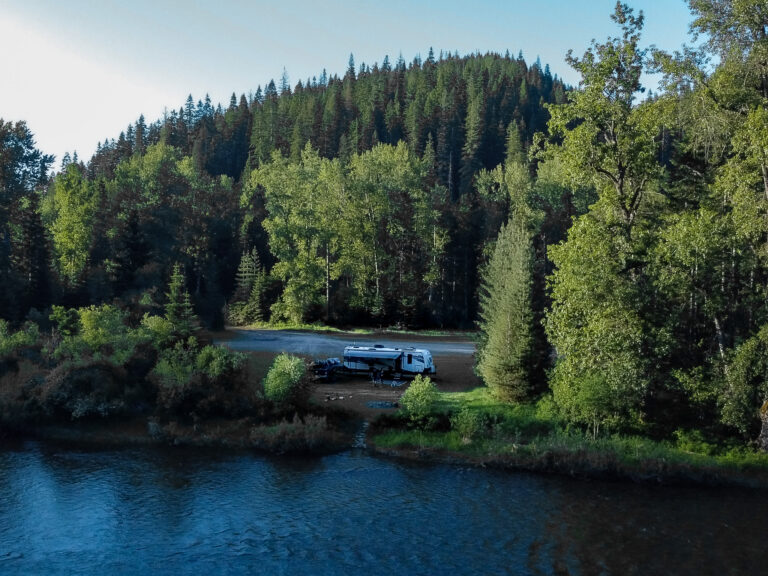
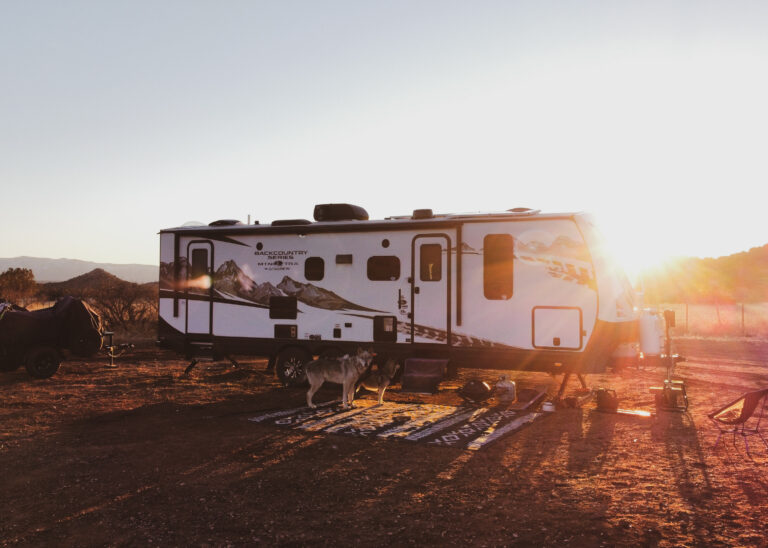
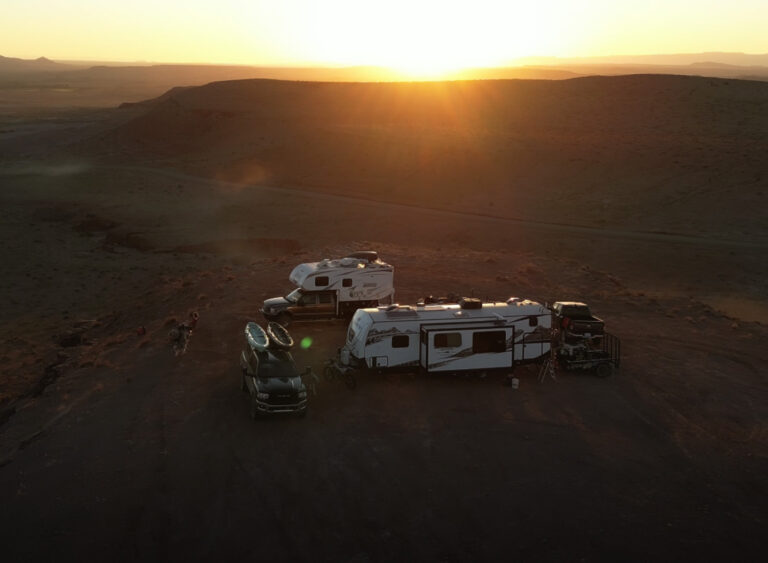
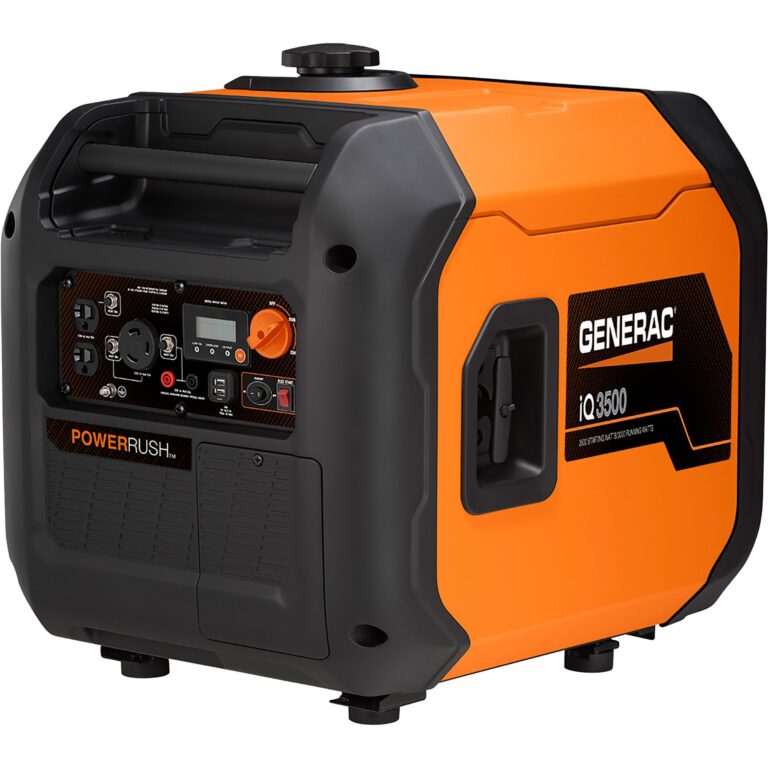
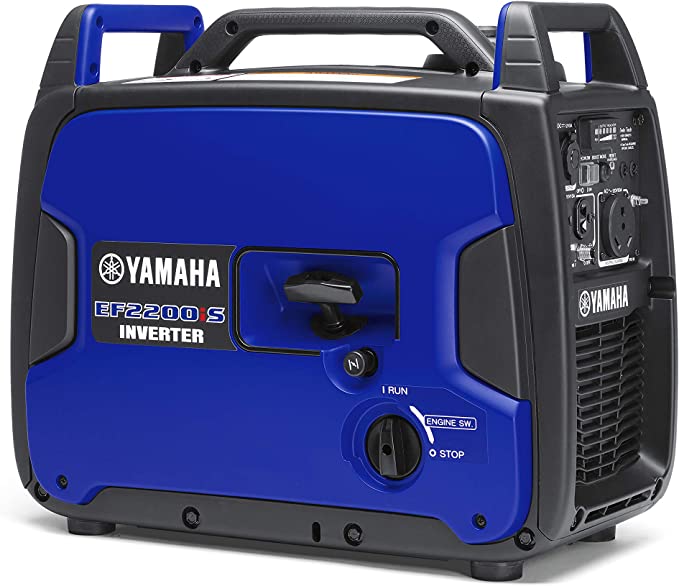
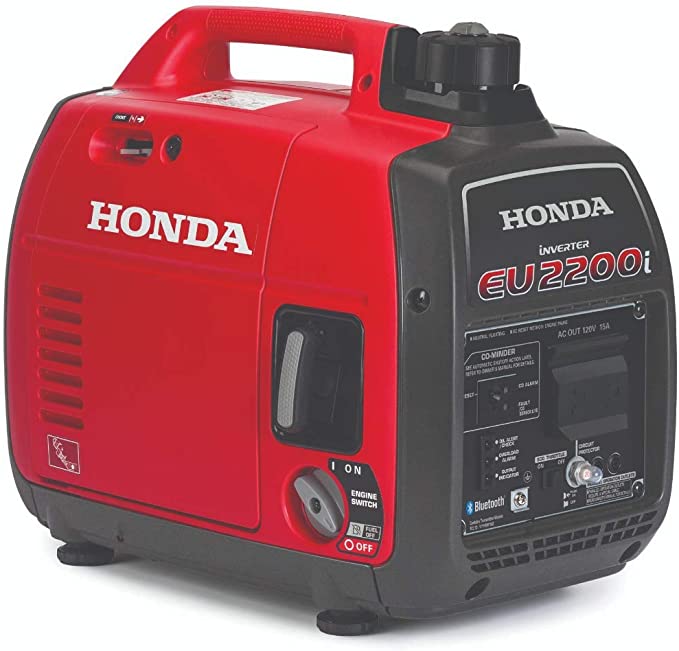
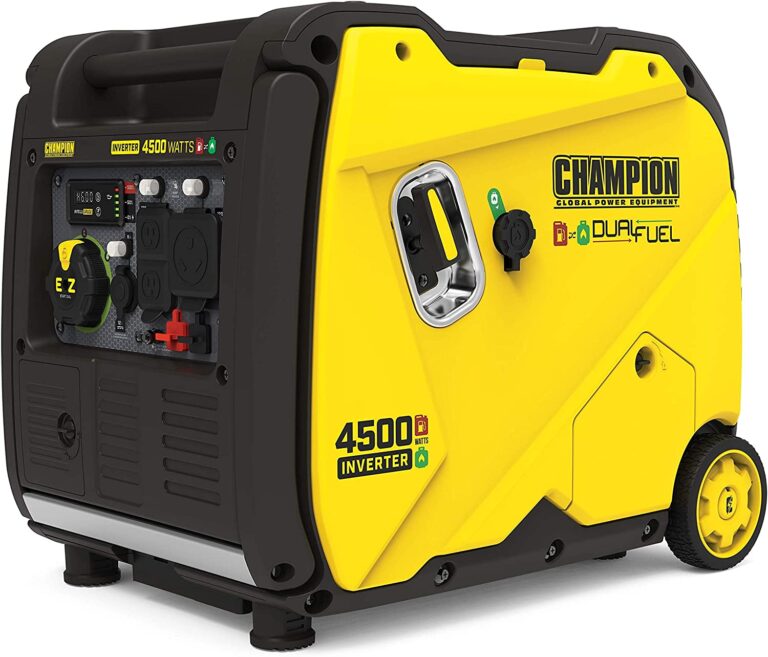
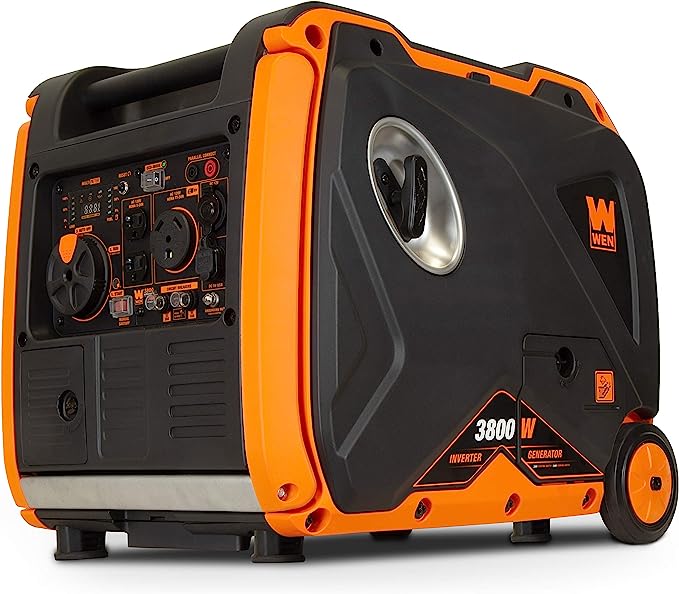
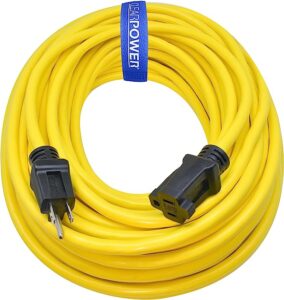
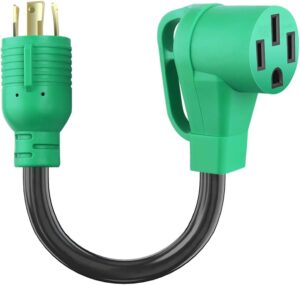
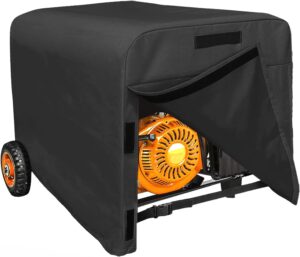
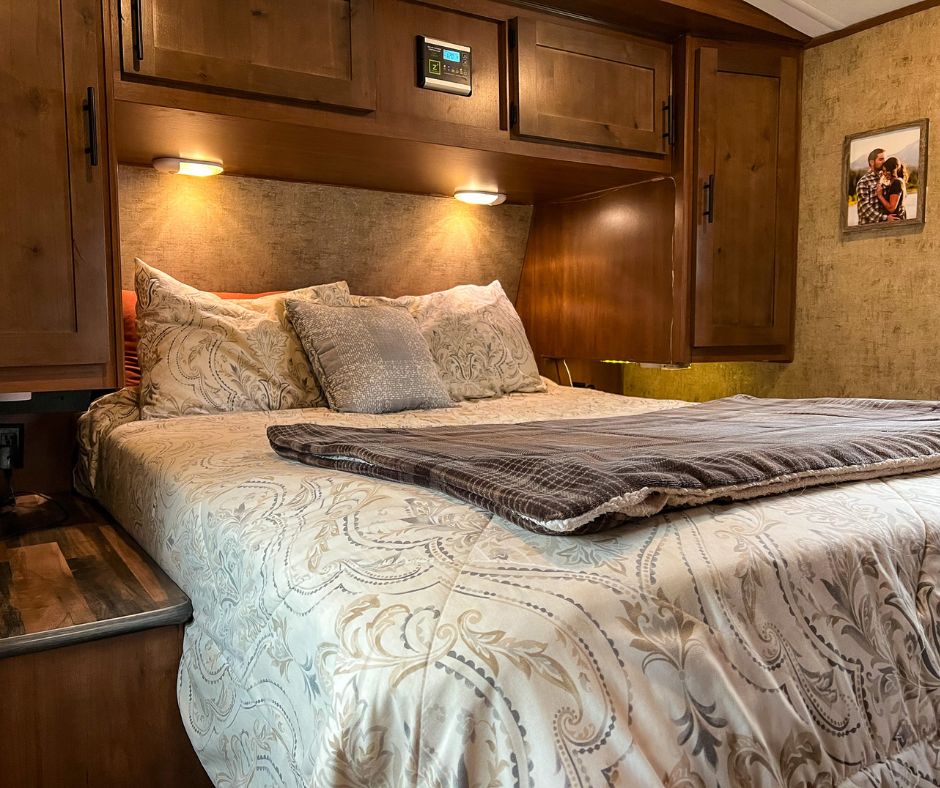

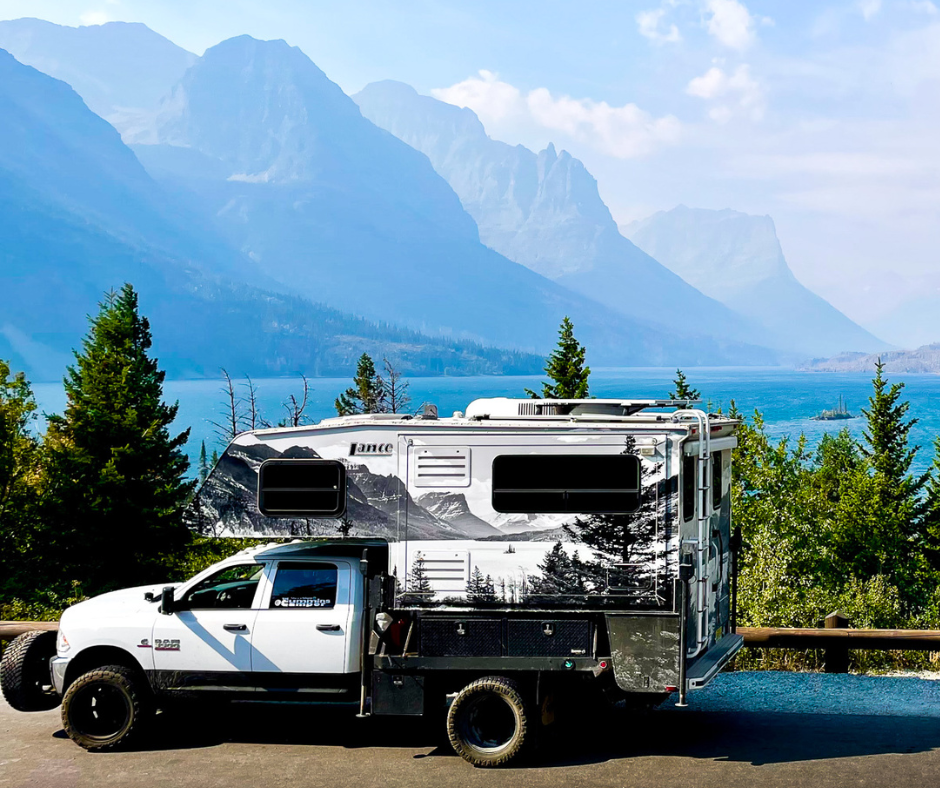

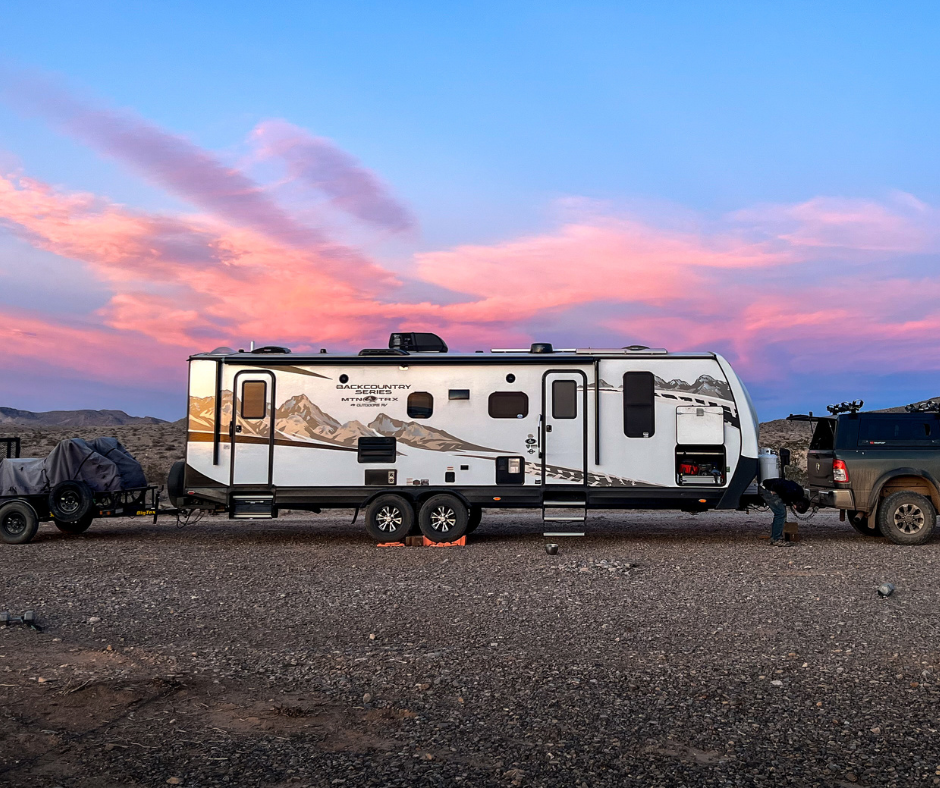
Do you plan on making any more YouTube videos? There are not alot of people that have the Outdoors RV model. We plan on buying one and are curious to see how they hold up and what problems people have with them..
Thanks.
Hey Reb, what kind of video do you want to see? I think we mentioned the issues we had with our Outdoors RV in our video! Nothing new has come up since filming it.